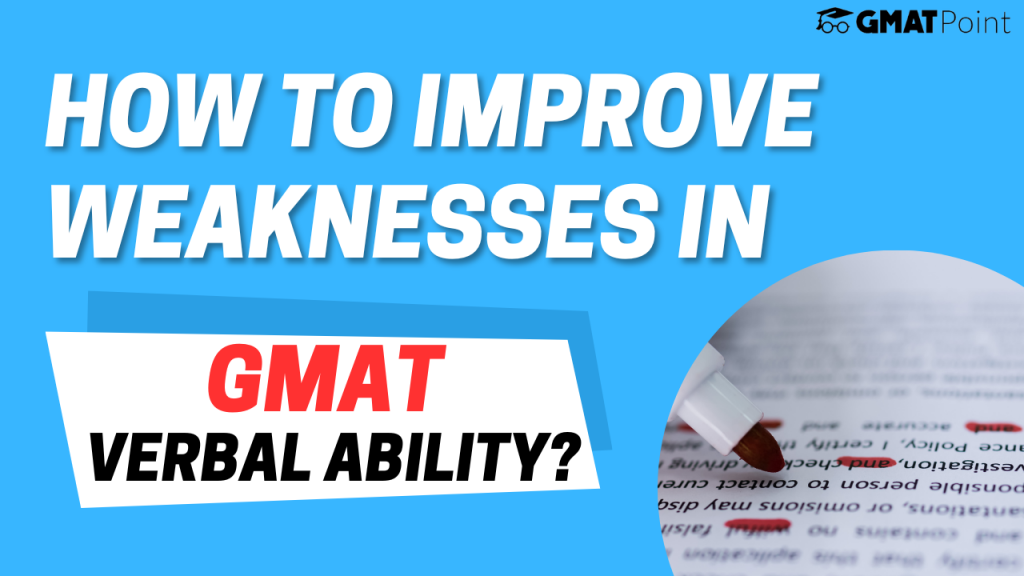The Graduate Management Admission Test (GMAT) is crucial in pursuing a business degree. Among its sections, Verbal Ability demands a strong command of the English language, including reading comprehension, critical reasoning, and sentence correction. For many test-takers, this section can pose challenges. However, with effective strategies and consistent practice, you can overcome weaknesses in verbal ability and boost your GMAT score. This article will explore practical techniques to enhance your verbal skills and conquer the GMAT.
Take Free GMAT 2023 Daily Targets
Subscribe To GMAT Preparation Channel
Strengthen Reading Comprehension:
Reading comprehension questions constitute a significant portion of the GMAT Verbal section. To improve your performance, follow these steps:
- Active Reading: Actively engage with the material when reading passages. Make mental notes of the main ideas, supporting details, and the author’s tone. For example, while reading a passage on economics, identify the author’s stance on supply and demand dynamics and note any contrasting viewpoints.
- Develop Vocabulary: Expanding your vocabulary is essential for understanding complex texts. Read various materials, such as newspapers, magazines, and business articles. Familiarise yourself with words frequently used in GMAT passages. For instance, when encountering the word “mitigate” in a passage, understand its meaning as “to reduce the impact of something” and note its context within the sentence.
Master Critical Reasoning:
Critical Reasoning questions evaluate your ability to analyse arguments and draw logical conclusions. Strengthen your performance with these strategies:
- Understand Question Types: Familiarize yourself with different question types, such as strengthen, weaken, assumption, and inference. For example, in a ‘weaken’ question, identify the flaw in the argument and select the option that exposes the weakness most effectively.
- Identify Argument Structure: Discuss the structure by identifying premises, assumptions, and conclusions. Look for logical flaws, unsupported claims, and unwarranted assumptions. For instance, if an argument claims that a certain marketing strategy is effective based solely on anecdotal evidence, you can identify the lack of empirical data as a flaw.
- Practice Logical Reasoning: Solve various logical reasoning problems from reputable GMAT preparation materials. Analyse the arguments carefully and choose the response option that aligns with your logical deduction skills. For example, in an assumption question, identify the underlying assumption the argument relies on for its validity.
Enhance Sentence Correction:
Sentence Correction questions test your understanding of grammar rules and ability to identify sentence construction errors. Strengthen your sentence correction skills with these tips:
- Review Grammar Fundamentals: Solidify your grasp of grammar rules, including subject-verb agreement, pronoun usage, parallelism, modifiers, and verb tenses. Understand common errors and practice applying the correct rules. For instance, review the correct usage of “its” versus “it’s” to avoid confusion.
- Pay Attention to Meaning: Sentence correction questions often provide multiple grammatically correct options. Focus on the sentence’s intended meaning and select the answer that conveys the clearest and most logical message. For example, consider the context and meaning of a sentence when choosing between active and passive voice.
- Practice Regularly: Solve various sentence correction questions from GMAT preparation resources. Analyse why certain choices are incorrect and reinforce your understanding of grammar rules. For example, when practising sentence correction, identify the error in the sentence and choose the option that rectifies it. This will help you internalise the grammar rules and improve your ability to spot errors. Take a free test on sentence correction now!
Improving weaknesses in verbal ability is paramount to achieving a high score on the GMAT. You can enhance your reading comprehension, critical reasoning, and sentence correction skills by supplementing the strategies discussed in this article and supplementing them with illustrative examples.
Active reading, vocabulary development, and speed reading techniques enable you to comprehend passages effectively and efficiently. Understanding question types and argument structures equips you with the analytical tools to navigate critical reasoning questions. Thorough knowledge of grammar fundamentals and attention to meaning empower you to excel in sentence correction.
Remember to practice consistently and utilise reputable GMAT preparation materials to familiarise yourself with the test format and question types. One such excellent yet free resource is the GMATPoint Daily Targets, where you will get one free test of verbal and quant questions daily, covering all the topics included in the syllabus of GMAT, which you must solve in a given time period. After you are done solving, you will get access to video solutions to the problems and a comparative analysis of your scores compared to other GMAT aspirants.
Seek additional resources such as GMAT study guides, practice exams, and online forums such as the GMATPoint Telegram group, and watch GMAT experts’ free lectures solving GMAT-level questions correctly at GMATPoint.
With dedication and perseverance, you can master the verbal ability section of the GMAT and unlock your full potential. Embrace the challenge, practice diligently, and believe in your abilities. Good luck on your journey to GMAT success and pursuing your business aspirations!
Also Read:
- Latest Update On GMAT Focus Edition (Changes In Format)
- GMAT Focus Edition | What We Know So Far
- GMAT 2023 Syllabus Download PDF | GMAT Quant, IR, AWA & Verbal Syllabus In Detail
- Everything about ISB Admissions
- GMAT Score vs Percentile | GMAT Percentile Ranking
- What Is GMAT? – Everything to know about the test
- How To Prepare For GMAT In 1 Month?
- What Is Tested In GMAT Verbal? How To Improve Verbal In GMAT?
- Introduction To GMAT Verbal Reasoning (With Solved Examples)
- How To Improve In GMAT Sentence Correction: Tips, Tricks, and Strategies
- 6 Interesting Facts About The GMAT Exam You Should Know
- GMAT preparation for beginners: What to Study and How
- 6 Best Practices for GMAT Preparation: The Ultimate Study Guide
If you are starting your GMAT preparation from scratch, you should definitely check out the GMATPOINT
